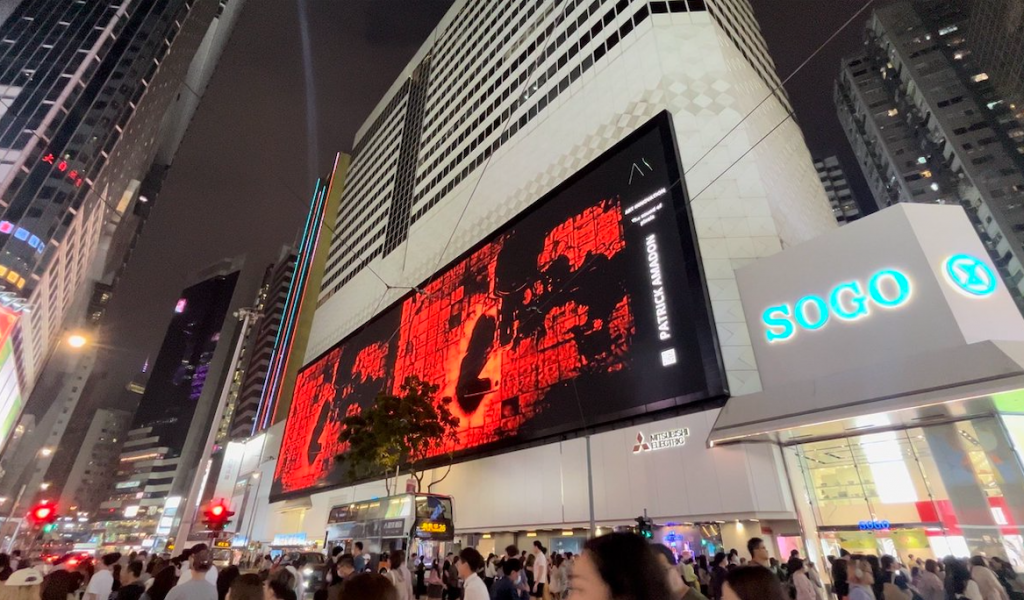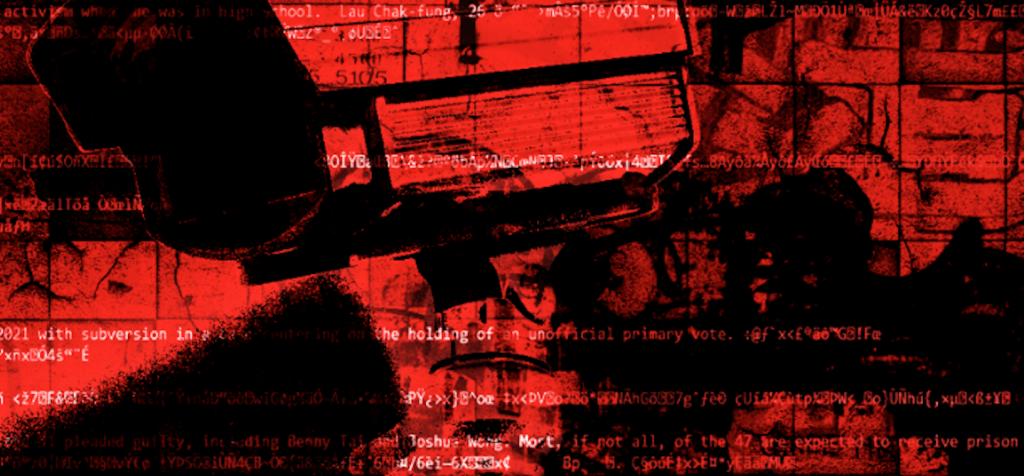Politics
A Gigantic Public Artwork About Hong Kong’s Protests Was Quietly Censored in the Middle of Art Basel Week
"A few years ago, this would have been an acceptable and legal expression," said the artist Patrick Amadon.

"A few years ago, this would have been an acceptable and legal expression," said the artist Patrick Amadon.

Vivienne Chow

A large-scale artwork on show during Hong Kong Art Week was removed after the artist revealed that the work is embedded with hidden messages supporting the jailed pro-democracy activists. Pro-Beijing media accused the artwork of being “pro black rioters,” referring to those who participated in the months-long pro-democracy protests that rocked the city in 2019.
Titled No Rioters, the digital moving image work by Los Angeles-based artist Patrick Amadon was part of the video exhibition “The Sound of Pixels,” organized by the Milan-based Art Innovation Gallery. The screening featured works by more than 70 digital artists from around the world on a LED billboard that measures 230 feet by 67 feet and was on view until today, March 23. The screen, the largest of its kind in region, hangs on the facade of a department store in the shopping district of Causeway Bay.
Amadon’s moving image work depicts a CCTV surveillance camera. After the screening launched, the artist revealed on social media that he secretly embedded names of the jailed political prisoners who were accused of violating the national security law, which was imposed in 2020 after the protests; details about their sentences and crimes flash across Amadon’s glitchy, stylized video.
The work’s title is part of a popular protest slogan from the 2019 Hong Kong protests: “No rioters, only a tyrannical regime.”
The artist’s message was first reported by local media outlets, and soon after the state-owned outlet Wen Wei Po ran a story on Wednesday, March 22, accusing the work of being “pro black rioters.” The work was removed a day early from the screening schedule (which ran until today) by the owners of the department store, Sogo.
“Art week in Hong Kong pretend[s] the Chinese government didn’t crush a democracy and turn Hong Kong in a vassal surveillance state for a week because it’s a convenient location for a good market,” Amadon told Artnet News. “I think it sends the message that money can buy absolution yet again.”

A screen shot of the flashing text from Patrick Amadon’s No Rioters. Names of jailed Hong Kong pro-democracy activists, including that of Benny Tai and Joshua Wong, are listed among the other 47 who were charged for breaching Hong Kong’s new national security law. Image courtesy of the artist.
Amadon said he knew the work could be controversial, but added that its total censorship was unexpected. “I knew the protesters’s names, ages, and sentences would be out of bounds. But it is art, and a few years ago this would have been an acceptable and legal expression,” the artist said.
Amadon did not tell Art Innovation Gallery about the hidden messages in the flashing text ahead of the exhibition launch. “[I] didn’t want [to force] the responsibility or liability of knowing on them,” he said. “Did I think it would cause this firestorm? No. I wouldn’t have imagined it would agitate as much as it obviously did. Guess it touched a nerve.”
In response to Artnet News’s enquiry, Art Innovation Gallery’s founder and CEO Francesca Boffetti said that the gallery was notified by their mediator that the owners of Sogo decided to take Amadon’s work off of display, and added that the gallery respected Sogo’s decision. “Art Innovation is based in Milan and in Europe, [where] there is freedom of expression. In China, the culture is different from ours,” Boffetti told Artnet News.
Sogo and its owner Lifestyle International did not respond to Artnet News’s requests for comments.
The removal of No Rioters came after Tuesday’s cancellation of the release of a British slash horror movie Winnie the Pooh: Blood and Honey. The film, which was approved by the local censorship board, was originally scheduled for a theatrical release in Hong Kong today, March 23. But the distributor backpedaled, announcing the sudden cancellation while citing “technical reasons,” adding that they were told by cinemas that the film could not be shown. The incident sparked speculations as the image of the cartoon figure had been previously linked to the Chinese President Xi Jinping, and Winnie the Pooh has been banned in China.
Both incidents happened as Hong Kong celebrates its post-pandemic return to the international stage amid the opening of Art Basel Hong Kong alongside various art events at cultural institutions. The international art world has descended on Hong Kong, but the city is noticeably different. There were also reports of increasing self-censorship following the implementation of the sweeping national security law in 2020.